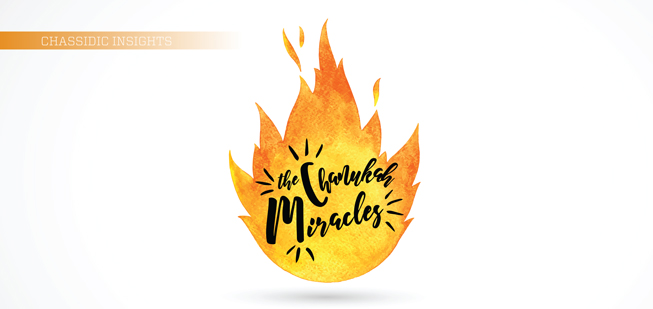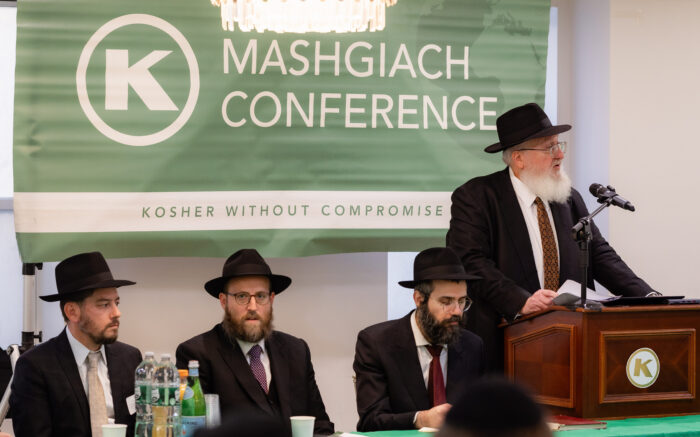The Talmud1 emphasizes primarily the spiritual aspect of the Chanukah miracles. Our Sages ask: “What is Chanukah?” — I.e., for which miracle was the holiday instituted?2 Their answer recounts the episode of the Menorah without elaborating on the military victory over the Greeks.
Although the miracle of the Menorah could not have taken place without the military victory, the victory itself does not define Chanukah. Chanukah is a holiday of spiritual light; even the war against the Greeks was essentially spiritual, since it was a struggle to preserve the Torah heritage from the taint of secular influence.3
This is why the prayer beginning VeAl HaNissim, which expresses thanks to Gd for the military victory, does not mention the spiritual miracle of the Menorah, for the latter eclipses it and is deserving of separate mention.4 There is thus a separate means of commemoration for each of these two miracles.
Body and Soul
The name Chanukah shares the same root as the Hebrew word for “education” — chinuch.5 This implies a connection between the commemoration of this holiday and our ongoing personal growth, for Chanukah, like all the festivals, communicates a message that applies even after its celebration has concluded.
On a basic level, the message of Chanukah — that spiritual light can overpower military might — teaches us the supremacy of soul over body. Although we are a composite of body and soul and although the soul needs the medium of the body in order to express itself, the supremacy of the soul is not limited; the soul invigorates the body, and controls its functioning.6
By emphasizing only the miracle of the lights, our Sages highlight yet a deeper lesson. Chanukah grants every soul the potential to express itself without any hindrance from the material nature of the body. One can live and function in the world without being influenced by worldliness.7 Chanukah enables us to live in the material world for the sake of a spiritual purpose, in the same way that the military victory over the Greeks was spiritually motivated. Chanukah further empowers us to make our lives within the world a medium for the expression of our spiritual service, like the miracle of the Menorah.
Living in this manner will hasten the coming of the era when this ability will spread throughout the world — in the Era of the Redemption, when “the earth will be filled with the knowledge of Gd as the waters cover the ocean bed.”8
May this take place in the immediate future.
1. Shabbos 21b.
2. Rashi, loc. cit.
3. See the above essay entitled, “Why the Maccabees Rebelled: A Superrational Commitment to the Torah.”
4. According to this interpretation, the phrase (in VeAl HaNissim) “and they kindled lights in Your holy courtyards” does not refer to the lighting of the Menorah(for that was kindled in the Sanctuary building), but rather other lights kindled in celebration of the military victory. [The Derashos of the Chasam Sofer (p. 67a) offer a different interpretation.]
5. The following essay develops this idea at length.
6. This concept has deeper significance pointing to — to borrow philosophic terms — the supremacy of form over matter. This principle lies at the heart of contemporary society, for in many areas, both in war and in peace, we have seen how superior thought, the medium with which we relate to form, can prevail over mere material power. This concept is paralleled in a halachic principle that eichus (“quality” or “inward virtue”) is given precedence over kamus (“quantity”).
7. Speaking of the halachic restrictions on transferring objects from one domain to another on Shabbos, our Sages (Shabbos 93b, as cited by Rambam in Hilchos Shabbos 18:28) state: “A person who transfers less than the standard measure [of a substance] is not liable even though he transfers it in a container. [Though he would have been liable had he transferred the container alone, here he is not liable, because] the container is subsidiary [to its contents]; [when the person transfers it,] he is concerned not with the container, but with what it contains.” Similarly, concerning the connection between our bodies and our souls, we can regard our material activities as having no independent importance, and see them as nothing more than a medium for the expression of our divine service.
8. Yeshayahu 11:9.
The content in this page is produced by Chabad.org, and is copyrighted by the author and/ or Chabad.org. If you enjoyed this article, we encourage you to
distribute it further, provided that you do not revise any part of it, and you include this note, credit the author, and link to www.chabad.org. If you wish to republish this article in a periodical, book, or website, please email [email protected].


 EN
EN  ZH
ZH  KR
KR  BR
BR  ES
ES  IN
IN  IL
IL 




